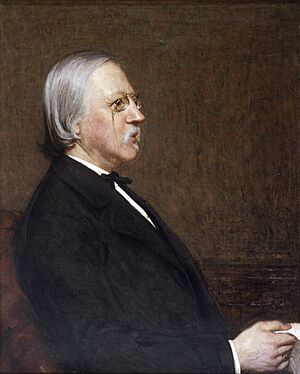Hendrick Peter Godfried Quack facts for kids
Quick facts for kids
Hendrick Peter Godfried Quack
|
|
|---|---|

Portrait by Hendrik Haverman (1899)
|
|
| Born | 2 July 1834 Zetten
|
| Died | 6 January 1917 (aged 82) |
| Academic work | |
| Main interests | Political economy, socialism |
Hendrick Peter Godfried Quack (born July 2, 1834 – died January 6, 1917) was a very smart Dutch man. He was a legal expert, an economist (someone who studies how money and resources work), and a historian (someone who studies the past). He is best known for his important book called De socialisten: Personen en stelsels. This means "The Socialists: People and Systems."
Contents
About Hendrick Quack
Hendrick Quack was born in Zetten. His father was a beer brewer. In 1853, he started studying at Utrecht University. Later, he studied law in Amsterdam at the Amsterdam Athenaeum Illustre.
In Amsterdam, he learned from two professors, Jeronimo de Bosch Kemper and Martinus des Amorie van der Hoeven. These professors were Christian thinkers who questioned liberalism. Liberalism was a popular idea at the time. It focused a lot on individual freedom. Quack learned from his teachers that liberalism might not solve all the big problems in society.
In July 1860, Quack earned his doctorate degree from Utrecht University. His thesis was about how states were organized in the 1300s.
Quack's Career Journey
After finishing his studies, Quack had many different jobs. In 1861, he worked as a clerk for the government in North Holland. Then, he became a journalist. He also worked for a while at the Chamber of Commerce in Amsterdam.
From 1860, he wrote for a literary magazine called De Gids. By 1863, he became one of its editors. In September 1863, he got a job as a secretary for the state railway company.
Becoming a Professor
In 1868, Quack became a professor at Utrecht University. He taught political economy. This is the study of how politics and economics are connected. Besides the usual lessons, he also taught his students about socialism. Socialism is an idea about how society and the economy should be organized, often focusing on fairness and community.
In 1875, he began writing his most important work, his magnum opus. This was the history of the socialist movement, called De socialisten: Personen en stelsels. The first part of this book came out in 1877. The last part was published twenty years later.
In 1877, Quack was chosen to be a member of the Royal Netherlands Academy of Arts and Sciences. This is a very respected group of smart people.
Working at the Bank
Also in 1877, Quack left his job as a professor. He started working at De Nederlandsche Bank, which is the central bank of the Netherlands. One reason he switched jobs was to earn more money. He needed it to buy more books for his studies and research.
He continued his historical work while at the bank. In 1885, Quack joined the board of directors at De Nederlandsche Bank. At the same time, he became a special professor at the University of Amsterdam. He taught the history of political economy there until 1894.
Quack's Views on Society
Quack was critical of economic liberalism. This means he didn't think that a completely free market, without rules, was the best way to run things. However, he never fully joined any socialist groups. He did attend a big meeting of international workers in The Hague in 1872.
He didn't join any other political groups either. He felt connected to liberals, but he didn't like how much they focused on individuals. He admired the goals of socialists, like wanting a fairer society. But he didn't like what he saw as their way of creating "mistrust and hate" to reach those goals.
Quack saw himself as a democrat. He felt that a politician named Johannes Tak van Poortvliet, who was a progressive liberal, was closest to his own ideas. People have described Quack as a "cathedral socialist." This means he believed in social justice, but perhaps in a more traditional or academic way.
Quack faced a difficult situation during the Railroad Strikes of 1903. At that time, he was the president of the state railroad company's board. He supported the decision to let go of many workers. He later wrote that this was "the most cruel page" in his life's book. But he still believed it was the right decision at the time.
Quack's Books
De socialisten. Personen en stelsels (three books, 1877–1897) is seen as Quack's most important work. It is a collection of life stories of early socialists. Many of these thinkers are now forgotten. Quack based his work on studying primary sources. These are original documents and materials from the time period he was studying.
Here are some of his other books:
- Martinus des Amorie van der Hoeven (1864)
- Traditie en Ideaal in het volksleven (1872)
- Studiën en schetsen (1886)
- Uit de kring der gemeenschap (1899)
- Herinneringen (1913)
 | Jackie Robinson |
 | Jack Johnson |
 | Althea Gibson |
 | Arthur Ashe |
 | Muhammad Ali |

